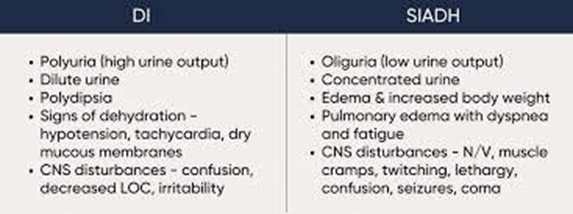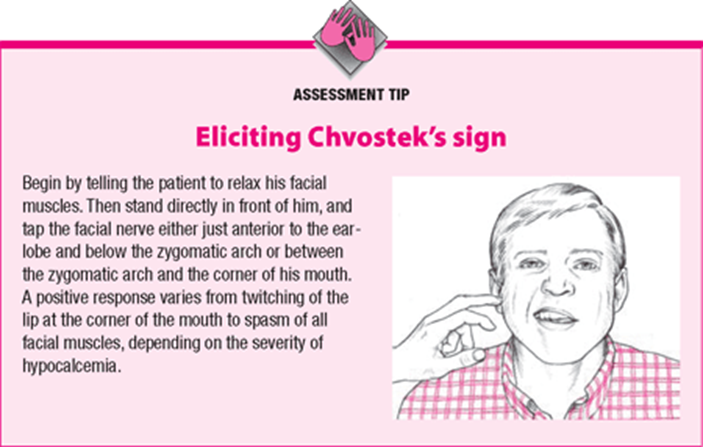A nurse is assessing a client who had a craniotomy and has developed syndrome of inappropriate antidiuretic hormone (SIADH). Which of the following manifestations should the nurse anticipate?
Weight loss
Oliguria
Hypernatremia
Increased thirst
The Correct Answer is B
A) SIADH leads to water retention due to excessive secretion of antidiuretic hormone (ADH), resulting in weight gain rather than weight loss.
B) SIADH causes the kidneys to retain water, leading to decreased urine output (oliguria) and concentrated urine.
C) SIADH typically results in dilutional hyponatremia due to water retention, not hypernatremia.
D) In SIADH, the body retains water excessively, leading to decreased serum osmolality and suppression of thirst, rather than increased thirst.

Nursing Test Bank
Naxlex Comprehensive Predictor Exams
Related Questions
Correct Answer is B
Explanation
A. Kernig's sign is a test for meningitis and is not related to the tingling sensation described by the client.
B. Chvostek's sign is a clinical sign of hypocalcemia, which can occur post-thyroidectomy due to inadvertent damage or removal of the parathyroid glands.
C. Babinski's sign is a test for upper motor neuron lesions and is not related to the tingling sensation described by the client.
D. Brudzinski's sign is a test for meningitis and is not related to the tingling sensation described by the client.

Correct Answer is B
Explanation
A. Blood urea nitrogen (BUN) can be affected by factors other than renal function, such as hydration status and protein intake.
B. Serum creatinine is a more specific indicator of renal function because it reflects the glomerular filtration rate (GFR). Elevated levels indicate impaired renal function.
C. Urine-specific gravity can provide some information about renal concentrating ability but is not as specific or sensitive as serum creatinine for assessing overall renal function.
D. Serum sodium levels may be affected by various factors, including hydration status and medications, but they do not directly reflect renal function.
Whether you are a student looking to ace your exams or a practicing nurse seeking to enhance your expertise , our nursing education contents will empower you with the confidence and competence to make a difference in the lives of patients and become a respected leader in the healthcare field.
Visit Naxlex, invest in your future and unlock endless possibilities with our unparalleled nursing education contents today
Report Wrong Answer on the Current Question
Do you disagree with the answer? If yes, what is your expected answer? Explain.
Kindly be descriptive with the issue you are facing.
